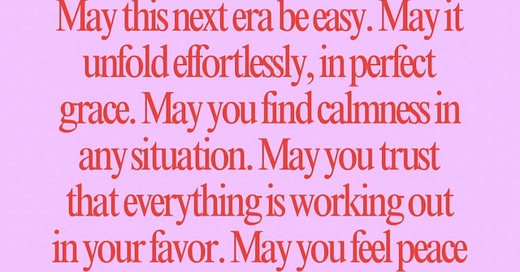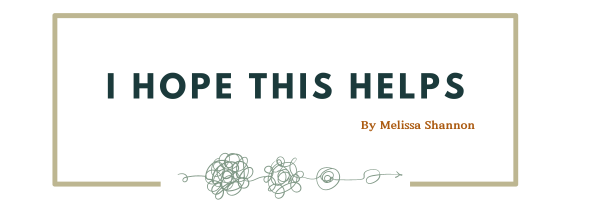If you’ve been here since the beginning (three years this September!) it will surprise you all of zero percent that I had all kinds of topics locked and loaded to yap about on here and then…crickets. October was just a lot. Not bad, not hard. Just full and I did what I could to simply keep up. I enjoy being here and sharing what I can to help in some small way and I usually build it up in my head to be more than what I actually have the time and capacity to deliver. In other words, my ego is writing checks my body can’t cash. But here I am, popping into your inbox yet again, promising November will be better. Bless my heart.
What I want to share with you today is something so timely and a lesson I genuinely believe will help as we wind down this year. Something I’ve personally been working through and help many clients tackle. So, if any of these descriptors apply to you:
-high achiever
-Enneagram 1, 3 or 8
-Type A
-neurodivergent (i.e. ADHD, gifted, autistic, Highly Sensitive, dyslexic )
-anxious
I want you to give yourself permission to stop doing your best.
When we hear encouragement and advice to give your best it is not meant to be taken literally. But unfortunately we tend to take a lot of things literally and think in black and white terms. If you tell me to try my best I am literally going to do that. Like, blood, sweat and tears- give it my all.
Part of this inclination to take directives literally comes from anxiety and feeling like if we do something exactly as we are being told to do it, we’ll control the outcome and we’ll know what is coming. We want to follow the rules, be impressive and be reliable. I want you to know that if you’re telling me to do my best you can count on me to actually do that and I will give you the result you’re looking for.
But if you want to do more than just survive, particularly in these times, you have to stop giving 100% all the time.
Your Expectations Of Yourself Are Probably A Mess
I want you to consider that your version of giving 100% may be (or…probably) is most people’s version of 150%. And you can’t sustain it. So you have to start by acknowledging that your standards and expectations of yourself and others are higher than everyone else’s. That said, doing what you consider to be your best is going to get you into trouble in a lot of ways. For me, this looks like:
I don’t actually know what my best is so it makes it hard to get the task started and I also don’t know when it’s finished. I get nervous to put my all into something because I know once that train leaves the station it’s not coming back.
I never have a sense of pride or accomplishment after completing something or handling a hard circumstance that someone else may seem impressed by. I’m simply relieved it’s over and I think that’s because I never establish a marker or goal for myself that I’m measuring success by. If my goal is to do “my best” that is far too subjective and something I don’t think I’ll ever reach.
I assume if I am judging myself harshly then everyone else is juding me even more harshly, so my best is probably not going to be good enough. This assumption fans the flame and creates a terrible feedback loop. I’ve got to constantly remind myself that there is likely no one judging me as critically as I am judging myself, so I can water down my efforts quite a bit and still be just fine.
I equate “my best” with doing something perfectly. I’m not sure at what point I started doing that and it’s still tricky to untangle the two, but anytime I think about doing my best I immediately jump to the standard of impeccable. And I sink right into the quicksand.
Always Doing Your Best = A Guaranteed Functional Freeze
When we don’t give ourselves permission to do anything other than our best, eventually we start burning out. Not allowing yourself to have a more nuanced view of your efforts and not accepting that doing well vs. doing your best may be the thing that saves you is what leads to most of us to teetering in and out of a functional freeze state. The seesawing in and out of this state is exhausting and disorienting in and of itself and I would wager that most of you reading this right now are in a functional freeze state and don’t even know it.
If you aren’t familiar with what that is, it’s like a survival response where you appear calm and highly functional but feel numb or detached inside. It’s usually triggered by chronic stress and it lets you cope on the outside but internally you’re avoiding overwhelming emotions. In this state, you probably continue your daily tasks and even excel in work or social situations but feel disconnected, struggle with emotional intimacy, and feel like you’re on auto-pilot and going through the motions. Often I hear clients express that they don’t feel present in their lives. They want to, but they just can’t.
Unlike a complete freeze, which I usually see brought on by more of an acute trauma, you’re usually more shut down and it’s just more obvious to people around you. A functional freeze hides your struggle which leads others (and maybe even you!) to overlook your needs.
Good Enough is Good Enough!
So instead of doing your best you’re going to aim to do it well. You’re going to do what you can to feel like it’s good enough and serves the needs of yourself and those around you with excellence. The goal is to do well in the moment, without hurting yourself, while ALSO keeping enough gas in the tank for everything else you have coming your way.
It helps to think about the here and now and the big picture. You can ask yourself is this good enough for right now and help me remain the version of myself I want and need to be for the next week, month, etc.?
Another thing you can do is look to others you respect in similar life roles or stages as you who seem to have healthier expectations of themselves and try to model some of their behaviors. You can ask yourself things like would this be good enough for (name)? Would she be beating herself up over this? Would (name) be as anxious about this or would he be really happy with this outcome already? I like to do that because when you run anxious you can get in your own head so much you often forget the bigger picture and to think like someone else for a second helps snap your perspective back into place.
Here’s to taking it a little easier on ourselves.
Cheering you on!
Melissa
p.s. Don’t forget to vote.








So so timely, I really needed this. Thank you🤍